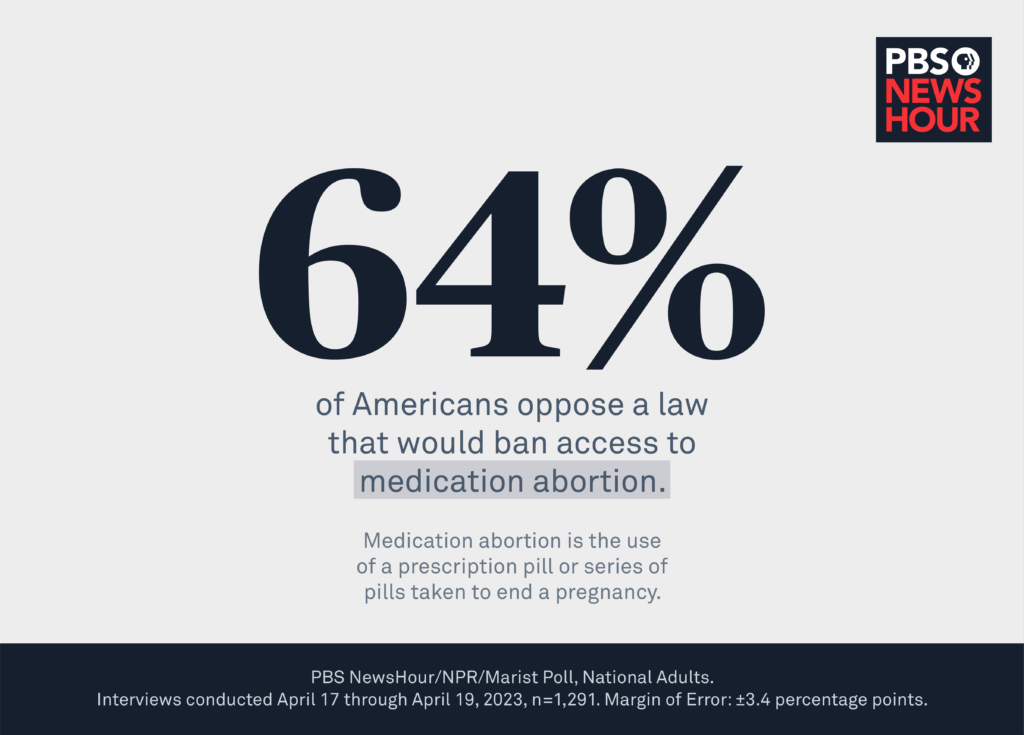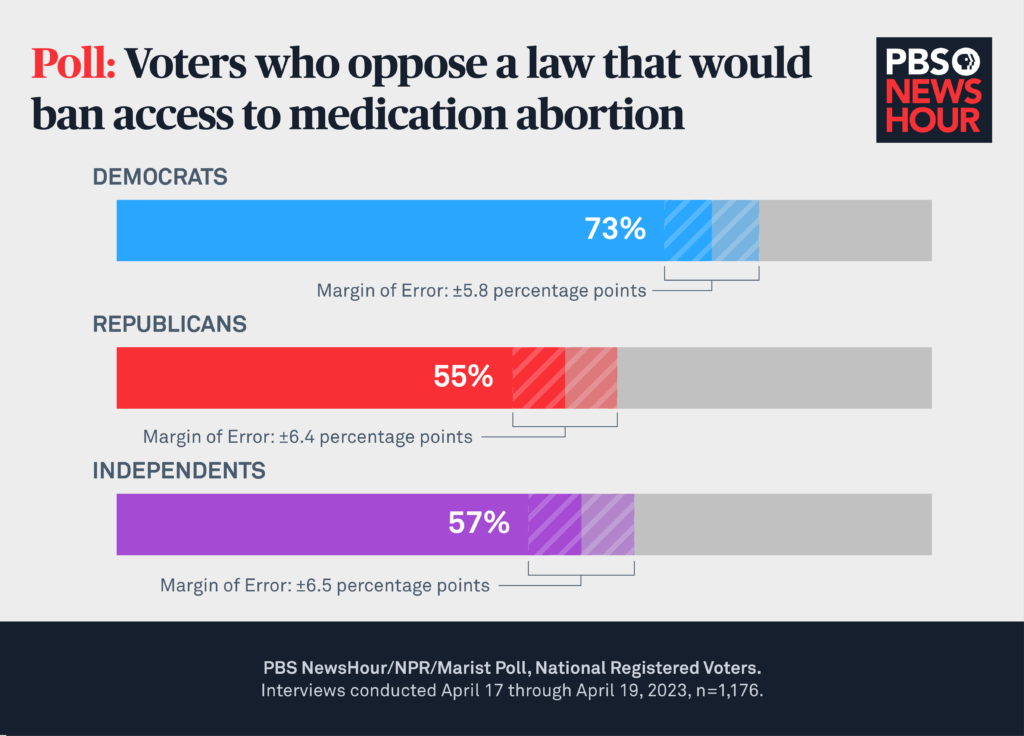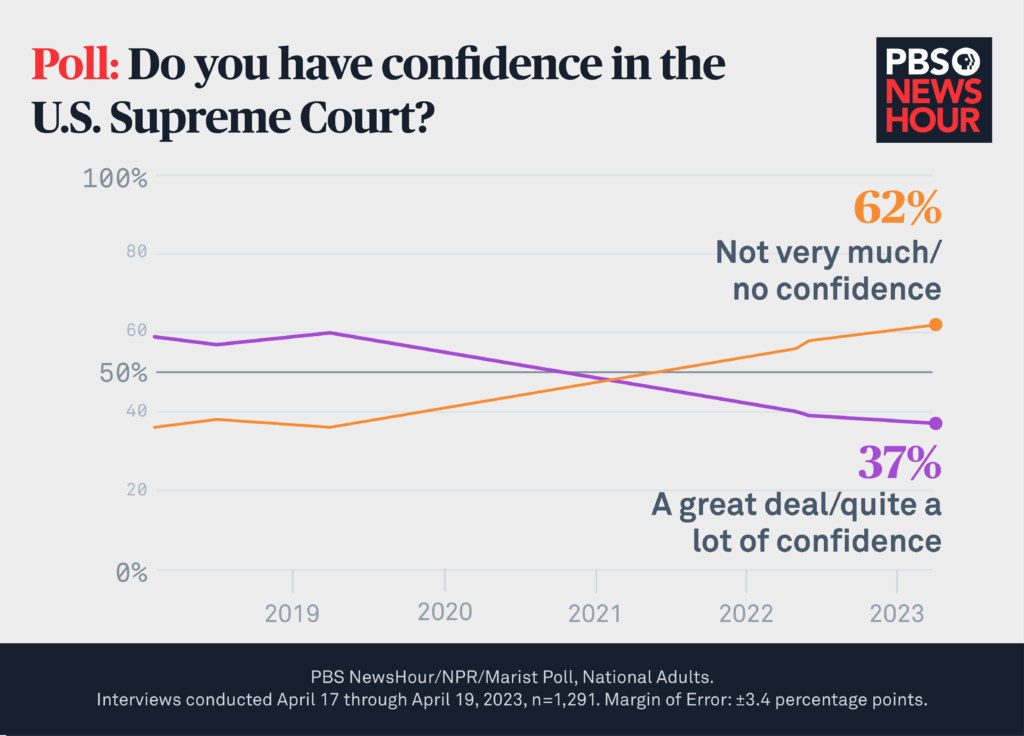Roughly two-thirds of Americans, including a majority of Republicans, oppose laws that ban access to medication abortion, in line with the Supreme Court’s move on Friday to maintain the status quo on the drug mifepristone for now. That’s according to the latest PBS NewsHour/NPR/Marist poll, which was conducted while the high court considered whether it would permit restrictions that would have dramatically diminished the availability of the drug.
READ MORE: Supreme Court preserves access to abortion pill while legal case continues
Across virtually all demographic groups, people do not support laws that prohibit access to such prescription medications. Even white evangelical Christians, who historically are more likely to support abortion restrictions, were split in this latest poll over whether or not medication abortion should be banned.
Since mifepristone was approved in the United States more than two decades ago, medication abortion is estimated to have been used safely in more than half of all abortions nationwide, according to the Guttmacher Institute. Health care providers also prescribe the medication for patients when a pregnancy is no longer viable or when the pregnant person’s life is in danger.

Chart by Megan McGrew/PBS NewsHour
On April 7, a federal district judge in Texas ordered the suspension of the Food and Drug Administration’s mifepristone approval, a decision that the Biden administration and the drugmaker, Danco Laboratories, rapidly appealed. Meanwhile, a judge in Washington required that the drug stay available in more than a dozen states and the District of Columbia. Days later, a federal appeals court ruled that the medication could stay on the market, but with stricter limits on how it is dispensed and when it can be taken.
Legal scholars say revoking the FDA’s approval via the courts could spark far-reaching effects beyond reproductive health care that reshape how prescription drugs are regulated nationwide.
READ MORE: How abortion bans will likely lead to more deadly infections
In this latest poll, 61 percent of Americans say that federal judges should not be allowed to overturn FDA approval of prescription drugs. That is especially true among 75 percent of Democrats, 62 percent of independents and 45 percent of Republicans. Even a slight majority of white evangelical Christians — 51 percent — do not think federal judges should interfere with FDA approval.
After pushing back its own deadline two days, the Supreme Court granted the emergency requests made by the Biden administration and Danco to allow access to mifepristone while the appeal process plays out.
This latest case adds yet more uncertainty to the future of abortion in America. Since the Supreme Court’s Dobbs decision last summer, procedural abortion has been outright banned in 13 states, while draconian restrictions have risen across a growing number of others.

Chart by Megan McGrew/PBS NewsHour
“We’re far from resolved in this country around abortion, and the courts are extremely busy,” said Alina Salganicoff, director for women’s health policy at the Kaiser Family Foundation.
As a result, patients and clinicians across the country are left confused over what’s allowed, under which conditions and for how long.
“People are starting to increasingly gain an awareness that, even by banning abortion, this has implications for pregnancy-related care writ large,” Salganicoff said.
Technically, a majority of Republican women oppose bans on medication abortion, but they were the least likely to do so in this poll. Opposition to bans was much more robust among Democratic women (seven in 10) and independent women (six in 10).
When it comes to opinions about abortion, a person’s political identity often plays the strongest role, Salganicoff said.
How public confidence in the Supreme Court has sunk
The percentage of Americans with significant confidence in the Supreme Court justices has dropped a remarkable 23 points over the last four years, this poll also found.
That confidence has further fallen since a majority of justices decided to lift federal protections for abortion rights, in what was “probably the most consequential decision the court has issued in recent years,” according to Marcia Coyle, Supreme Court analyst for the PBS NewsHour.

Chart by Megan McGrew/PBS NewsHour
Reports have also raised questions and sharp critique over potential ethical conflicts for Justice Clarence Thomas, including his receiving lavish trips from a wealthy Republican political donor and sitting on cases that involved his wife, Ginni Thomas, and her communications supporting efforts to overturn the 2020 presidential election.
These events have combined to create a “legitimacy crisis,” Coyle said, especially as the court is overruling long-standing precedents “without a substantial justification.”
“All of those factors – the decisions, the ethics – are all coming together and harming the court in the public’s view, and the public [is] having less confidence in the court because it perceives it as being more political or partisan,” Coyle said.
On April 20, Sen. Dick Durbin, D-Ill., who chairs the Senate Judiciary Committee, invited Chief Justice John Roberts to testify following “a steady stream of revelations regarding Justices falling short of the ethical standards expected of federal judges, and indeed, of public servants generally.” Pointing to a “crisis of public confidence,” Durbin wrote, “The status quo is no longer tenable.”
READ MORE: The history and future consequences of the Supreme Court’s conservative shift
Two-thirds of Americans polled say Supreme Court justices should serve limited terms. That opinion holds broad consensus across every single demographic – political party, gender, income, education, race and geographic region of the United States.
One of the few issues that seems to unite the American public, this attitude has changed little since July 2015, when 72 percent of U.S. adults said they wanted to do away with lifetime appointments to the Supreme Court. At the same time, 30 percent of Americans say they are fine with justices holding lifetime appointments. That support is highest among Republican men, at 53 percent, and 42 percent of Republicans overall are in favor of justices serving as long as they want.
The PBS NewsHour, NPR and Marist Poll conducted a survey between April 17 and April 19 that polled 1,291 U.S. adults with a margin of error of 3.4 percentage points and 1,176 registered voters with a margin of error of 3.5 percentage points.
ncG1vNJzZmivp6x7sa7SZ6arn1%2Bjsri%2Fx6isq2eYmq6twMdoqq6oopq6pnnCqKyrrKNiurDCxGamp2WRl7yzwMiopWaomaG5brXNZqOippVixKrAx2akmqKfp7a1xYyonWaZnZq%2Fqq%2FAp6o%3D